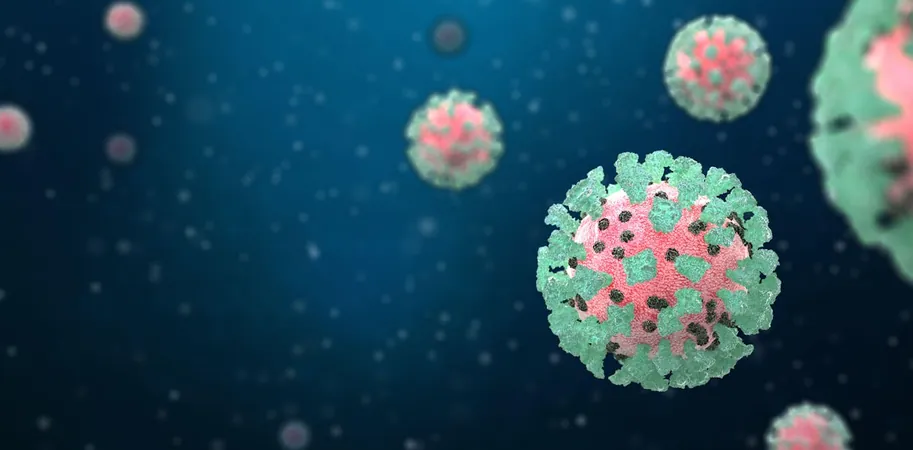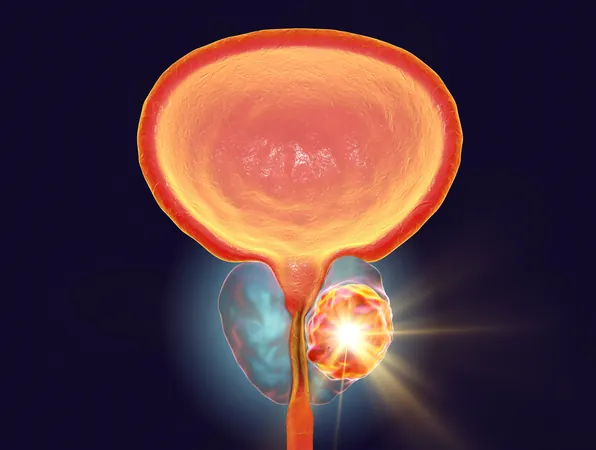
Surprising New Study Reveals COVID's Unexpected Role in Shrinking Cancer Tumors in Mice
2024-11-22
Author: Rajesh
Introduction
In a groundbreaking discovery published in the Journal of Clinical Investigation, researchers have unveiled a surprising potential benefit of severe COVID infections: the ability to shrink cancer tumors. This unexpected finding, derived from studies on mice, has opened doors to innovative cancer treatment methodologies and deepens our understanding of the intricate relationship between the immune system and cancer cells. However, it is important to emphasize that this does not suggest that individuals should seek out a COVID infection.
The Role of Monocytes
The research centered on a specific type of white blood cell known as monocytes, which are crucial to the body’s defense mechanisms against infections and other threats. Unfortunately, in cancer patients, these monocytes can sometimes be manipulated by tumor cells, turning them into allies that shield the tumor from immune responses.
Induced Monocytes and their Properties
What this study found is that severe COVID infections prompt the body to generate a particular subset of monocytes that possess unique anti-cancer properties. These 'induced' monocytes, originally designed to combat the virus, also maintain the ability to attack cancer cells effectively.
Mechanism Behind Monocyte Activation
Delving deeper, researchers discovered that these induced monocytes carry a special receptor that effectively binds to a specific fragment of COVID's RNA. Ankit Bharat from Northwestern University illustrated this with a simple analogy: 'If the monocyte was a lock, and the COVID RNA was a key, then COVID RNA is the perfect fit.'
Successful Trials in Mice
To test their hypothesis, the team administered a drug to mice suffering from several advanced-stage cancers, including melanoma, lung, breast, and colon cancer, which artificially triggered the immune response typical of severe COVID. The results were astonishing—tumors in all cancer types showed significant reduction.
The Advantages of Induced Monocytes
Unlike ordinary monocytes, which can be reprogrammed by tumors to become protective, these induced monocytes retained their original purpose. They demonstrated an ability to migrate effectively to tumor sites—an ability not commonly seen in immune cells—and once there, they activated natural killer cells that actively attacked cancer cells, leading to tumor regression.
Implications for Cancer Treatment
This discovery is particularly important as it introduces a new avenue for cancer treatment that doesn't rely on T cells, a primary focus of current immunotherapy methods, which only work in 20% to 40% of cases and often fail when T cell production is inadequate.
Future Prospects and Risks
The research, although conducted in mice, raises exciting prospects for future human trials. If these mechanisms translate to humans, they may be applicable to various cancer types, potentially addressing a common pathway many cancers exploit to spread.
Moreover, while COVID vaccines are not likely to activate this same mechanism, there is potential for developing new drugs and vaccines tailored to stimulate the production of these cancer-fighting monocytes.
This research underlines a phenomenon known as 'trained immunity,' where exposure to one pathogen enhances the overall immune response against another, suggesting broad implications for treating diverse diseases beyond just cancer.
Conclusion
It is critical, however, to stress the risks associated with COVID. The pursuit of a COVID infection to reap potential cancer-fighting benefits is dangerous and misguided, given the serious health consequences of the virus.
This study not only highlights the importance of resilient scientific research, even amid a global health crisis but also sheds light on the potential advancements in our understanding of infectious diseases and cancer biology. As further investigations unfold, they may lead to new, more targeted therapies—representing a hopeful future where innovative solutions arise from unexpected scientific findings.



 Brasil (PT)
Brasil (PT)
 Canada (EN)
Canada (EN)
 Chile (ES)
Chile (ES)
 España (ES)
España (ES)
 France (FR)
France (FR)
 Hong Kong (EN)
Hong Kong (EN)
 Italia (IT)
Italia (IT)
 日本 (JA)
日本 (JA)
 Magyarország (HU)
Magyarország (HU)
 Norge (NO)
Norge (NO)
 Polska (PL)
Polska (PL)
 Schweiz (DE)
Schweiz (DE)
 Singapore (EN)
Singapore (EN)
 Sverige (SV)
Sverige (SV)
 Suomi (FI)
Suomi (FI)
 Türkiye (TR)
Türkiye (TR)